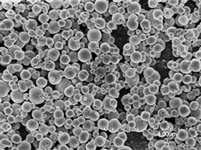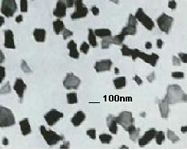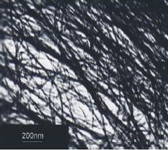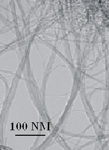|
|
|
1 Identification of substance:
- Product name: Titanium nitride
- Stock number: SN4301
- Manufacturer/Supplier:
Sun Innovations, Inc.
- 43241 Osgood Rd.
Fremont, CA 94539 |
|
2 Composition/Data on components:
- Chemical characterization:
Description: (CAS#)
Titanium nitride (CAS# 25583-20-4): 100%
- Identification number(s):
- EINECS Number: 247-117-5
|
|
3 Hazards identification
- Hazard description: F Highly flammable
- Information pertaining to particular dangers for man and environment
R 11 Highly flammable.
- Classification system
- HMIS ratings (scale 0-4)
(Hazardous Materials Identification System)
Health (acute effects) = 1
Flammability = 2
Reactivity = 2 |
|
4 First aid measures
- After inhalation
Supply fresh air. If required, provide artificial respiration. Keep patient warm.
Seek immediate medical advice.
- After skin contact
Immediately wash with water and soap and rinse thoroughly.
Seek immediate medical advice.
- After eye contact
Rinse opened eye for several minutes under running water. Then consult a doctor.
- After swallowing Seek immediate medical advice.
|
|
5 Fire fighting measures
- Suitable extinguishing agents
Carbon dioxide, extinguishing powder or water spray. Fight larger fires with water spray or alcohol resistant foam.
- Special hazards caused by the material, its products of combustion or
resulting gases:
In case of fire, the following can be released:
Metal oxide fume
Nitrogen oxides (NOx)
- Protective equipment:
Wear self-contained respirator.
Wear fully protective impervious suit. |
|
6 Accidental release measures
- Person-related safety precautions:
Wear protective equipment. Keep unprotected persons away.
Ensure adequate ventilation
Keep away from ignition sources
- Measures for environmental protection:
Do not allow material to be released to the environment without proper governmental permits.
- Measures for cleaning/collecting:
Absorb with liquid-binding material (sand, diatomite, acid binders, universal binders, sawdust).
Ensure adequate ventilation.
Keep away from ignition sources.
- Additional information:
See Section 7 for information on safe handling
See Section 8 for information on personal protection equipment.
See Section 13 for disposal information. |
|
7 Handling and storage
- Handling
- Information for safe handling:
Keep container tightly sealed.
Store in cool, dry place in tightly closed containers.
Ensure good ventilation at the workplace.
- Information about protection against explosions and fires:
Keep ignition sources away.
Protect against electrostatic charges.
Fumes can combine with air to form an explosive mixture.
- Storage
- Requirements to be met by storerooms and receptacles:
Store in a cool location.
- Information about storage in one common storage facility:
Store away from oxidizing agents.
Protect from heat.
- Further information about storage conditions:
Keep container tightly sealed.
Store in cool, dry conditions in well sealed containers. |
|
8 Exposure controls and personal protection
- Additional information about design of technical systems:
Properly operating chemical fume hood designed for hazardous chemicals and having an average face velocity of at least 100 feet per minute.
Components with limit values that require monitoring at the workplace:
Not required.
- Additional information: No data
- Personal protective equipment
- General protective and hygienic measures
The usual precautionary measures for handling chemicals should be followed.
Keep away from foodstuffs, beverages and feed.
Remove all soiled and contaminated clothing immediately.
Wash hands before breaks and at the end of work.
- Breathing equipment:
Use suitable respirator when high concentrations are present.
- Protection of hands:
Impervious gloves
Check protective gloves prior to each use for their proper condition.
- Material of gloves
The selection of suitable gloves not only depends on the material, but also on quality. Quality will vary from manufacturer to manufacturer.
- Eye protection: Safety glasses
- Body protection: Protective work clothing.
|
|
9 Physical and chemical properties:
- General Information
- Form: Powder
- Color: Black
- Odor: Odorless
- Value/Range Unit Method
- Change in condition
- Melting point/Melting range: 2950 degrees C
- Boiling point/Boiling range: Not determined
- Sublimation temperature / start: Not determined
- Flash point: Not determined
- Ignition temperature: Not determined
- Decomposition temperature: Not determined
- Explosion limits:
- Lower: Not determined
- Upper: Not determined
- Vapor pressure: Not determined
- Density: at 20 degrees C 5.22 g/cm3
- Solubility in / Miscibility with
- Water: Not determined
|
|
10 Stability and reactivity
- Thermal decomposition / conditions to be avoided:
Decomposition will not occur if used and stored according to specifications.
- Materials to be avoided:
Oxidizing agents
Heat
- Dangerous reactions No dangerous reactions known
- Dangerous products of decomposition:
Metal oxide fume
Nitrogen oxides |
|
11 Toxicological information
- Acute toxicity:
- Primary irritant effect:
- on the skin: Irritant to skin and mucous membranes.
- on the eye: Irritating effect.
- Sensitization: No sensitizing effects known.
- Subacute to chronic toxicity:
Titanium compounds are considered physiologically inert. There are no reported cases in the literature where titanium as such has caused human intoxication.
- Additional toxicological information:
To the best of our knowledge the acute and chronic toxicity of this substance is not fully known.
No classification data on carcinogenic properties of this material is available from the EPA, IARC, NTP, OSHA or ACGIH. |
|
12 Ecological information:
- General notes:
Do not allow material to be released to the environment without proper governmental permits. |
|
13 Disposal considerations
- Product:
- Recommendation
Consult state, local or national regulations to ensure proper disposal.
- Uncleaned packagings:
- Recommendation:
Disposal must be made according to official regulations. |
|
14 Transport information
- DOT regulations:
- Hazard class: 4.1
- Identification number: UN3178
- Packing group: III
- Proper shipping name (technical name):
Flammable solid, inorganic, n.o.s. (titanium nitride)
- Land transport ADR/RID (cross-border)
- ADR/RID class: 4.1 Flammable solids
- Item: 11c
- Danger code (Kemler): 40
- UN-Number: 3178
- Description of goods: Flammable solid, inorganic, n.o.s. (titanium nitride)
- Maritime transport IMDG:
- IMDG Class: 4.1
- UN Number: 3178
- Packaging group: III
- Proper shipping name: Flammable solid, inorganic, n.o.s. (titanium nitride)
- Air transport ICAO-TI and IATA-DGR:
- UN/ID Number: 3178
- Packaging group: III
- Proper shipping name: Flammable solid, inorganic, n.o.s. (titanium nitride)
|
|
15 Regulations
- Product related hazard informations:
- Hazard symbols: F Highly flammable
- Risk phrases: 11 Highly flammable.
- Safety phrases:
33 Take precautionary measures against static discharges.
60 This material and its container must be disposed of as hazardous waste.
- National regulations
All components of this product are listed in the U.S. Environmental Protection Agency Toxic Substances Control Act Chemical substance Inventory.
- Information about limitation of use:
For use only by technically qualified individuals. |
|
16 Other information:
Employers should use this information only as a supplement to other information gathered by them, and should make independent judgement of suitability of this information to ensure proper use and protect the health and safety of employees. This information is furnished without warranty, and any use of the product not in conformance with this Material Safety Data Sheet, or in combination with any other product or process, is the responsibility of the user.
|
|
|














